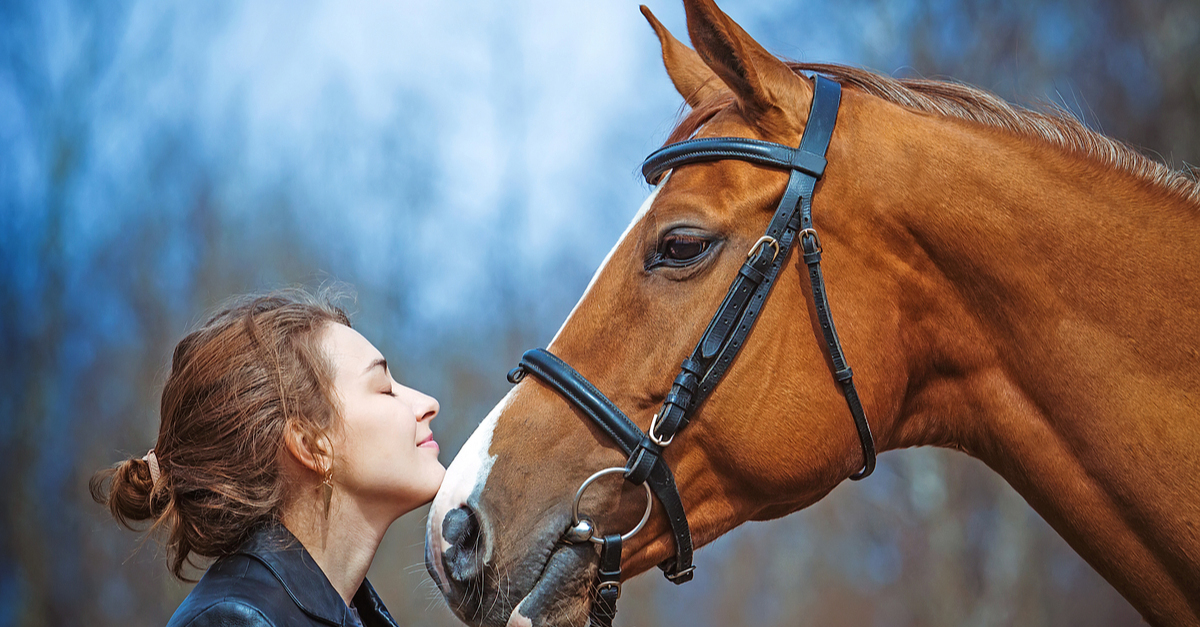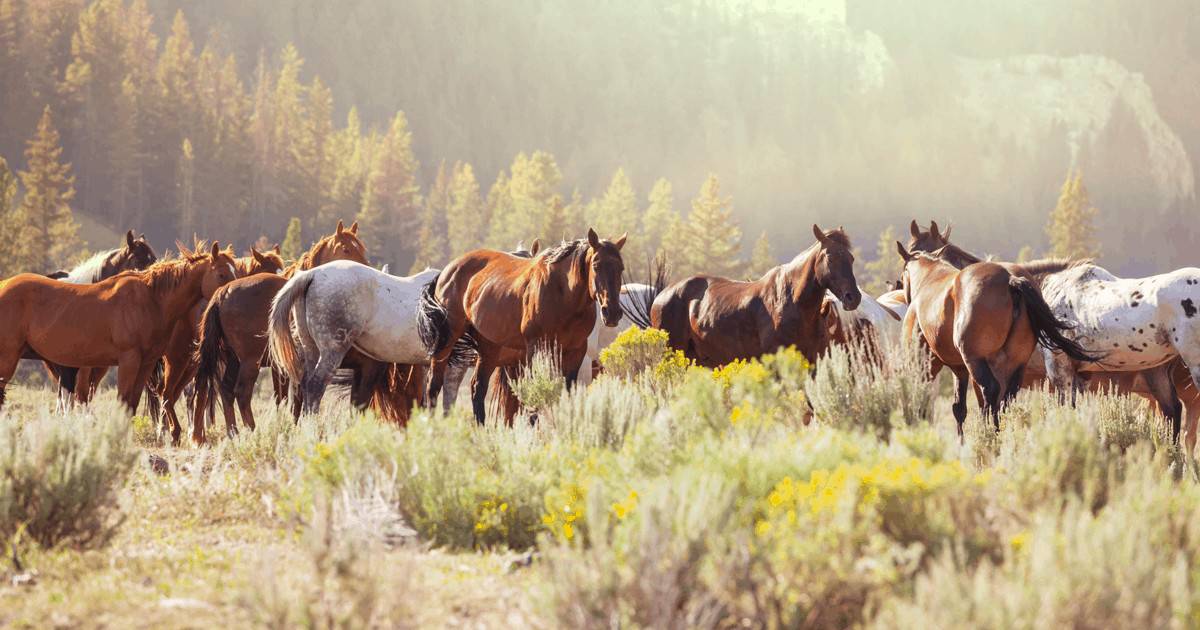Horses recognise human emotions, why not use that to strengthen your bond?
Research in the past few years has demonstrated that horses are really good at recognising and responding to human moods and emotions, through voice, body language and facial expressions. But do you know how to deploy their super power to build a strong bond?
Horses are a highly social prey animal whose survival relies on accurately interpreting cues from the environment – whether it is to identify potential predators or to protect the social cohesion of their band.
Recognising visual cues, and responding to the emotional changes in other horses is essential for survival, it allows the horse to react correctly, for example, showing vigilance towards an area when another horse does the same, or moving away from a horse that pins their ears back and points their nose towards them.
Horses have naturally developed the capacity to recognise very subtle cues from other horses as a way to develop and maintain close relationships that benefit the survival of the species, and researchers have a special interest in finding out if their capacity extends to recognising emotion in humans.
As a result, there have been multiple studies investigating whether horses are able to recognise the emotional valence of human body language and expressions, and (spoiler alert…) the consensus is that they can, and they are very good at it. Perhaps better than we are at recognising theirs!
For example, in a 2017 British study, Amy Smith and her colleagues found that horses were more likely to freely approach someone with a submissive posture (closed posture) than a dominant posture (open posture), and no horses, overall, favoured the dominant posture.
Using similar methods, other studies have shown that as well as body language, horses recognise emotion in human voice and facial expressions – even when they are not directed at them!
For example, in 2019, Miléna Trösch and her colleagues, presented horses with an audio recording of an angry voice and a joyful voice. Not surprisingly, the horses were significantly more vigilant during the angry voice, and significantly more relaxed during the joyful voice. Heart rate also increased during playback of the angry voice, suggesting a stress response.
To add a twist and provide even more evidence of how good horses are identifying our emotions, in the same study, they presented horses with pictures of angry and joyful expressions and played the voice audios that did not match the expressions, as well as with pictures that did match. They found that horses spent significantly longer looking and investigating the pictures and audios that did not match.
The researchers explain that the fact the horses found the mis-match of voice and facial expression intriguing, strongly suggests they recognise emotion in humans.
So how does all this affect our relationship with our horses?
In an interview with Horses and People, Dr Lea Lansade, one of the researchers in this study, was particularly surprised at how “even a simple groan of discontentment caused the horse’s heart rate to shoot up… and a smile could appease them”.
Our horses can recognise positive and negative emotions in us the moment we turn up at the stables, and this is why Dr Lansade recommended we carefully manage our emotions around our horses.
Other researchers have added more weight to this by showing that horses don’t just recognise emotion but remember and learn to discriminate people based on previous experiences.
Studies by Serenella d’Ingeo and her colleagues (2019) and the team led by Leanne Proops (2018) showed that a horse will respond accordingly to a past positive or negative experience they have had with someone, pinning their ears back towards a person they have had mainly or only negative experiences with.
What can we learn from the research?
It may be useful to think of our relationship with our horses as a piggy bank and each interaction as a trust coin.

Think of your interactions with your horse as a piggy bank where you add or subtract ‘trust’ coins. Image: Shutterstock.
When we have a positive interaction we are putting a trust coin into the piggy bank, and if we keep doing this, over time, we will have a magnificent trust savings account.
In contrast, each negatively charged interaction is like taking out trust from the piggy bank, however, because bad experiences are ‘worth’ more than good ones, each bad interactions removes two trust coins from the piggy bank.
The more you take from the piggy bank, the closer you are to an empty trust account; even worse…you may go into the red!
With every interaction you have with your horse, you are adding to or taking away from the trust bank. Whether it is taking your horse to a new yard, feeding them, grooming them, arriving at the yard in a grumpy mood, arguing with someone over the phone while your horse is there, or making a training mistake, your horse is listening and learning something.
Horses are continuously learning about the positives and negatives in their environment, perhaps they are better at this than we are. We need to be mindful of the emotional valence of our interactions, how much we are putting in and taking out of our trust account. We must do whatever we can to keep the piggy bank balance positive and high.
You too can keep your horse’s trust account healthy by understanding how your mood and emotions affect your relationship, and then by managing them all the time you are with them.
References
Trösch, M.; Cuzol, F.; Parias, C.; Calandreau, L.; Nowak, R.; Lansade, L. Horses Categorize Human Emotions Cross-Modally Based on Facial Expression and Non-Verbal Vocalizations. Animals 2019, 9, 862. https://doi.org/10.3390/ani9110862
Smith, A.V., Wilson, C., McComb, K. et al. Domestic horses (Equus caballus) prefer to approach humans displaying a submissive body posture rather than a dominant body posture. Anim Cogn 21, 307–312 (2018). https://doi.org/10.1007/s10071-017-1140-4
Serenella d’Ingeo, Angelo Quaranta, Marcello Siniscalchi, Mathilde Stomp, Caroline Coste, Charlotte Bagnard, Martine Hausberger, Hugo Cousillas. Horses associate individual human voices with the valence of past interactions: a behavioural and electrophysiological study. Sci Rep 9, 11568 (2019). https://doi.org/10.1038/s41598-019-47960-5
Leanne Proops, Kate Grounds, Amy Victoria Smith, Karen McComb, Animals Remember Previous Facial Expressions that Specific Humans Have Exhibited, Current Biology, https://doi.org/10.1016/j.cub.2018.03.035.


















